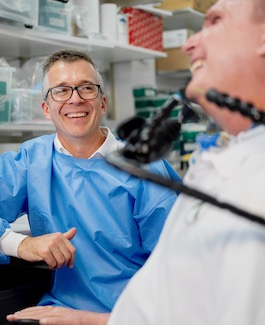Developing the world’s first saliva-based test for early diagnosis for head and neck cancers
Professor Chamindie Punyadeera, distinguished researcher at Griffith, is at the forefront of translational science, bridging biomedicine and engineering to create transformative applications with real world impact. As a global authority on saliva-based diagnostics, she pioneered the development of the world’s first saliva-based test for early diagnosis for head and neck cancers, benefiting over one million patients worldwide.
Early detection is key. If you find cancer early, it's an 80% survival rate as opposed to 20%
Professor Chamindie Punyadeera
Chamindie’s visionary work began as a deeply personal mission – her brother-in-law passed away from head and neck cancer in 2006, just months after diagnosis. He was only 37. From this terrible personal loss, Chamindie is now leading a multidisciplinary team that is spearheading the development of non-invasive technologies, including wearable diagnostics and biosensors. At the core of the research is a desire to enable early detection of cancer for everyone, no matter where they live.
Informing the research, was a saliva test study which detected cancer in an asymptomatic patient. A tumour not picked up by other scans was removed, with the patient recovering in as little as two weeks.
These groundbreaking achievements would not have been possible without the generous support from the Passe & Williams Foundation, Tour de Cure and the Royal Brisbane and Women’s Hospital Foundation. Their investment and belief in Chamindie’s research journey has enabled the lifesaving early detection of cancers for many patients across Australia, creating healthier lives for all.
Read more impact stories

Using nasal stem cells to find new ways to treat spinal cord injury
Professor James St John’s team are developing new therapies to give people back their independence.

The transformative power of music
Thanks to the Distinguished Visiting Artist-Teacher Residency Program, students are learning alongside the best in the industry, bringing renowned musicians, directors and performing artists to work with our students at Griffith.

Changing the lives of mothers in prison and their children
Prof Susan Dennison's team are piloting programs to change the lives of incarcerated mothers, approaches that are designed to reduce reoffending and put an end to intergenerational cycles of adversity.